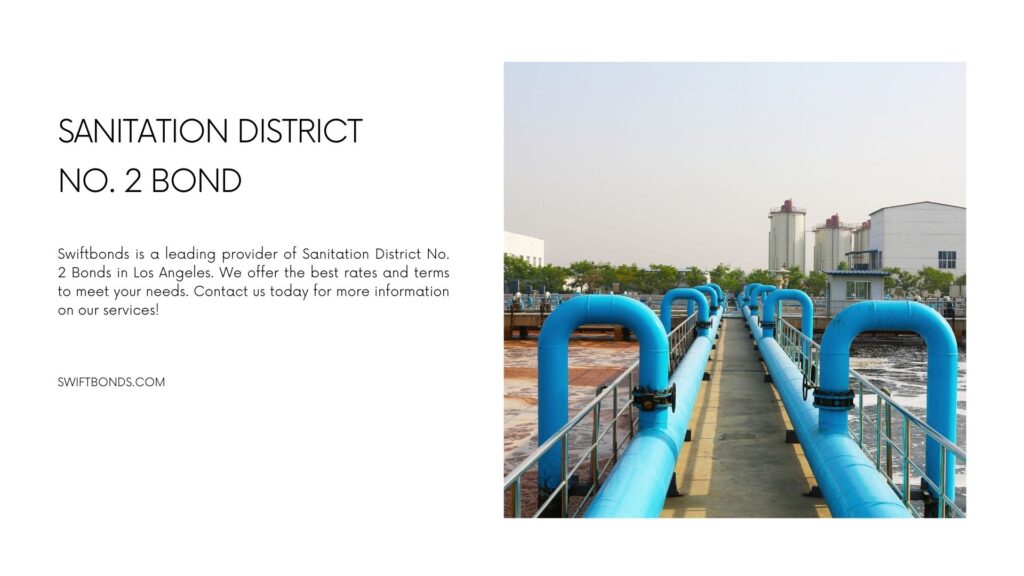
Get An Instant Quote on Los Angeles County Sanitation District No. 2 Bond Now
Introduction
The Los Angeles County Sanitation District No. 2 plays a vital role in managing wastewater and sanitation services for its residents and businesses. To ensure the reliability and continuity of these essential services, the district may require certain financial assurances, such as bonds. The Los Angeles County Sanitation District No. 2 Bond serves as a critical component in securing funding for infrastructure projects and maintaining operational standards. Understanding the purpose and implications of this bond is crucial for stakeholders and the community alike. Let’s delve into the specifics of this bond, its significance, and its impact on sanitation services in Los Angeles County.

What is the Los Angeles County Sanitation District No. 2 Bond and Why Does it Matter?
The Los Angeles County Sanitation District No. 2 Bond is a type of financial instrument used to raise capital for infrastructure projects and operational expenses related to wastewater treatment and sanitation services. This bond is issued by the district to investors, who provide funds that are crucial for the construction, maintenance, and improvement of sanitation facilities, pipelines, and related infrastructure. It serves as a means for the district to finance essential projects that ensure the safe and efficient management of wastewater for residents and businesses within its jurisdiction.
For investors, purchasing the Los Angeles County Sanitation District No. 2 Bond offers a stable investment opportunity backed by the district’s commitment to maintaining infrastructure and providing essential services. The bond typically offers predictable returns through interest payments and may be backed by the district’s revenue streams or the full faith and credit of the local government, depending on its structure and terms.
Understanding the Mechanics of the Los Angeles County Sanitation District No. 2 Bond
How does the Los Angeles County Sanitation District No. 2 Bond operate in practice? The district issues bonds through a formal process that involves determining the amount needed for specific projects or operational expenses. Investors purchase these bonds, effectively lending money to the district for a defined period. The district then uses the proceeds to finance infrastructure projects such as the construction or expansion of wastewater treatment plants, sewer system upgrades, or environmental compliance measures.
Bondholders receive periodic interest payments throughout the bond’s term, which typically ranges from several years to several decades, depending on the project’s scope and financing needs. At maturity, the district repays the principal amount borrowed to bondholders, completing the repayment of the debt incurred for the financed projects.
Navigating Community Impact and Future Development
The issuance of the Los Angeles County Sanitation District No. 2 Bond plays a crucial role in the district’s ability to meet the growing demand for wastewater and sanitation services in a rapidly expanding urban environment. By funding essential infrastructure projects, the bond supports public health, environmental sustainability, and regulatory compliance goals. It ensures that residents and businesses continue to receive reliable sanitation services while supporting economic growth and quality of life improvements in Los Angeles County.
Conclusion
The Los Angeles County Sanitation District No. 2 Bond is not just a financial instrument; it’s a cornerstone of infrastructure development and public service delivery in one of the nation’s largest metropolitan areas. By securing funding through bonds, the district can modernize facilities, expand capacity, and enhance operational efficiency, thereby meeting the current and future needs of its constituents. As Los Angeles County continues to evolve, the commitment to maintaining robust sanitation infrastructure remains paramount, ensuring a cleaner, healthier environment for generations to come.
Frequently Asked Questions
Can individual residents or businesses invest in the Los Angeles County Sanitation District No. 2 Bond?
While municipal bonds like those issued by the Los Angeles County Sanitation District No. 2 are typically purchased by institutional investors or bond funds, there may be uncommon instances where individual residents or businesses inquire about investing directly. Municipal bonds are often sold in larger denominations and are more commonly accessible through brokerage platforms or bond mutual funds rather than directly to individual investors. The district’s bonds are typically marketed through financial advisors or underwriters specializing in municipal bonds, ensuring compliance with regulatory requirements and offering opportunities for institutional investors seeking stable returns through infrastructure investments.
Are there specific environmental or sustainability criteria that infrastructure projects funded by the Los Angeles County Sanitation District No. 2 Bond must meet?
While the primary purpose of the Los Angeles County Sanitation District No. 2 Bond is to fund essential infrastructure projects related to wastewater treatment and sanitation services, there may be uncommon considerations related to environmental and sustainability criteria. Infrastructure projects financed by the bond may be required to adhere to environmental regulations, including water quality standards, air emissions controls, and habitat protection measures. The district may also prioritize projects that incorporate sustainable practices such as energy efficiency, resource recovery, or use of renewable energy sources in wastewater treatment processes. These criteria ensure that bond-funded projects not only enhance infrastructure but also contribute positively to environmental stewardship and community sustainability goals.
What happens if the Los Angeles County Sanitation District No. 2 Bond does not fully subscribe or reach its targeted issuance amount?
In uncommon cases where the issuance of the Los Angeles County Sanitation District No. 2 Bond does not fully subscribe or reach its targeted issuance amount, the district may adjust its financing plans or consider alternative funding sources for infrastructure projects. The district may choose to restructure the bond offering, adjust interest rates or terms to attract additional investors, or seek alternative financing options such as grants, loans, or partnerships with private sector entities. Ensuring sufficient funding for critical infrastructure projects remains a priority for the district, and adjustments in financing strategies may be necessary to meet operational needs, regulatory requirements, and community expectations for sanitation services.

